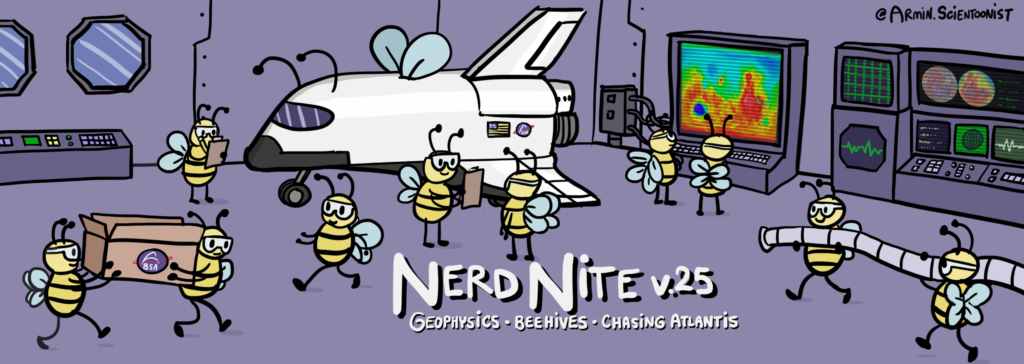What do Jules Verne, Charles Darwin, Ray Kurzweil, Chuck Yeager, Nicolaus Copernicus, Galileo Galilei, and Steve Jobs all have in common? They’re all famous white male scientists that have birthdays in February. But for every famous male scientist there’s a female scientist that deserves just as much recognition like Lydia DeWitt, Elizabeth Blackwell, Mary Douglas Leakey, Ruth Sager, Aletta Henriette Jacobs, Agnes Mary Clerke, Margaret Knight, Margaret Warner Morley, Agnes Arber, or Ida Noddack. If you don’t know who any of those ladies are, look them up, and come with a nerdy tidbit about one of them and share it with us!
Where: The Fox Cabaret
When: Wednesday, February 22nd; Doors @ 7
Tickets: online
Photos by: lindsaysdiet.com
Music by: DJ Bürger
1. People and Pollinators: Opportunity in the Inner City
Sarah Common
In the hustle of daily city life people and activity surround us, and yet isolation is pervasive. Disconnected from land, food and community, penned in by consumption and convenience, our culture is fractured. Our ecosystems and communities are falling into crises. With diminishing populations of pollinators, increasing poverty, marginalization and disparity, hope for our future can be difficult to find and maintain. Think Blade Runner.
But there is hope, for people and pollinators alike: together we can turn the cultural tides. After all, revolutions are built on hope. By building inclusive green spaces in the heart of a city, you build communities. Here, a diversity of plants, pollinators and people will thrive, regardless of perceived worth, capacity, or socio-economic capital.
The bees have sweet little knees; they have specific but simple needs. This talk will give you tools to build your relationship with them. And then you won’t be that person at the party staring blankly into space thinking “the bees are dying at an alarming rate.”
Bio: Sarah is the co-founder, CEO and Chief Community Officer, Hives for Humanity Society She is a support worker, beekeeper and gardener in the Downtown Eastside of Vancouver (DTES). She is passionate about fostering vibrant and healthy community through empowerment and education, and believes in the profound impact of connecting individuals and communities to their land, food and spirit.
2. Looking at rocks with physics
Lindsey Heagy
What killed the dinosaurs? Where is the billion-dollar gold deposit that will make me rich!? What these questions have in common is that we need to examine the rock-record beneath the surface. Similar to non-invasive medical imaging, where an MRI is used to generate images of your brain, in geophysics, we use gravity, seismic and electromagnetics, to make images of subsurface geology.
Bio: Lindsey Heagy is a PhD student in the Geophysical Inversion Facility at UBC studying numerical geophysics and the application of electromagnetics for monitoring subsurface injections: eg. carbon capture and storage, and hydraulic fracturing. She is a project-lead on GeoSci.xyz (http://geosci.xyz), an effort to build collaborative, interactive, web-based textbooks.
3. Chasing Atlantis: A Documentary About Not Going to Space
Matthew Cimone
Inspired by the final flight of the space shuttle – Shuttle Atlantis – Matthew Cimone, joined by director Paul Muzzin, embarks on a journey to reconnect with a lost childhood dream of being an astronaut. During his travels, Matthew interviews current and retired astronauts, scientists, science fiction writers, actors, and other space enthusiasts to discover why – as Carl Sagan said – the Sky Calls to Us.
Bio: Matthew Cimone, inspired by Star Trek, grew up believing that life is about exploring the universe and doing good. Having studied International Development at the University of Toronto, Matthew spent 2004-2005 working in Sierra Leone, and in 2006 was named a UN Youth Ambassador. Over 70,000 people have heard Matthew’s speeches where he often combines his passions for social justice and space. His TEDx talk “Why Diamonds in Space Inspire Me to Support a School in West Africa” challenges audiences to consider the value of life from a cosmic perspective and to see the world as we do from space; without borders. In 2012 Matthew became Co-Founder and CEO of Esther’s Echo, a non-profit that supports a school for vulnerable girls and women in Sierra Leone. He currently lives in Vancouver as a Residence Life Coordinator at Simon Fraser University and a volunteer at the Trottier Observatory and Science Courtyard.
